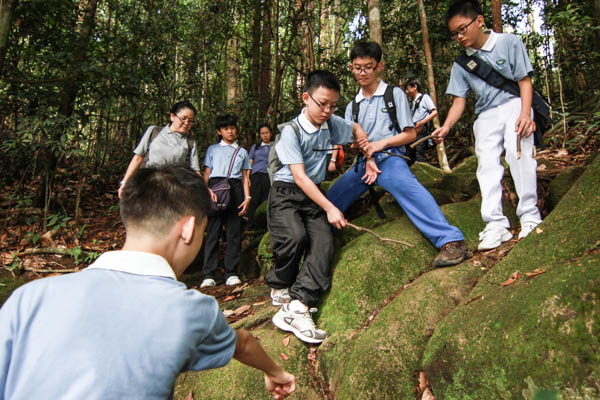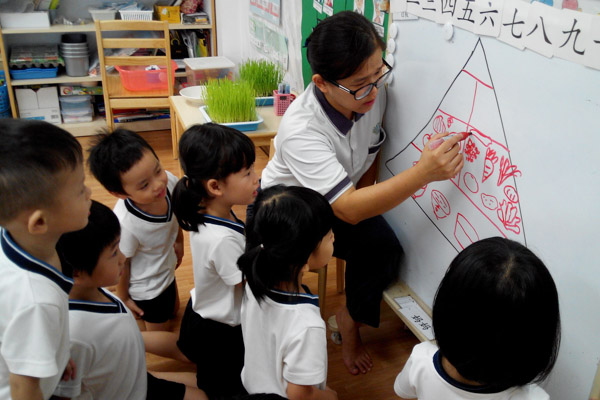
Four-year-old Wu Ding Nan (right) said, “These people (the poor) are very pitiful. They eat rubbish and have no homes……we should make good aspirations and do good deeds, and donate a little money every day.” (Photo by Bernard Ng)
The kitchen of the Tzu Chi Great Love PreSchool normally has delicious smells wafting out prior to mealtimes, but today was a little different. The little children did not detect anything amiss however, and 3 June 2016 appeared to them like any other school day. In fact, it was a day for a special lesson at the PreSchool, where the shock value of an experiential session awaited them.
Boil water, wash the rice and cook porridge—these are the daily tasks of the PreSchool’s chef Chen Quan Feng. He did not quite have the heart to see the children eat such a plain meal that day, and remarked that it was a special day where austerity was the theme; only white rice gruel would be served up for lunch.
Seeing the tasty meal that was normally served during lunch become a bland meal of white rice porridge, the expressions on the face of the preschoolers said it all.
Plain Porridge— A Shockingly Simple Meal for a Lesson
The atmosphere in the classroom was grave during lunch. The children ate very slowly, and there were no requests for a second helping.
Six-year-old Chen Jian Hong dawdled over his gruel, supporting his head in his hands and was a picture of great reluctance to continue after a few mouthfuls. “It’s not nice, there aren’t any other ingredients,” he muttered.
His schoolmate Liu Guan Hong announced unhappily, “Doesn’t smell delicious!”
After a seemingly interminable period of waiting and under words of encouragement, the last mouthful was finally swallowed and every one immediately burst into applause.
Teacher of the class of six-year-olds Zhang Wen Hui explained, “Consuming plain rice porridge teaches them to empathize with other starving children; the next step is to inspire them to help those in need.”
The Tzu Chi Great Love PreSchool emphasizes the inculcation of ethics so that though its students are living in an affluent society, they can understand that suffering exists in the world and engage in kind acts to create blessings. Therefore in June, the PreSchool arranged for a series of lessons to teach its students how to extend love and a helping hand to others, as well as to nurture kind thoughts in their hearts every day. The objective of the plain rice gruel lunch was thus to let the children experience for themselves how the poor ate.
An Aspiration in Line With the Bamboo Bank Era
“Why do these children have such big bellies?”
“Why do they have to look around for food on the ground?”
“Why do they have so many flies on their faces?”
These were the questions that the teacher asked her class of preschoolers. Along with pictures and descriptions as teaching aids, she led the discussion along and topics such as wasting food, to the “Haiti mud cookies” consumed by the poor, were touched upon.
Before the experiential class, every teacher carefully elaborated on the topic beforehand to the preschoolers. To make a bigger impression on them, every preschooler was asked to bring a container from home to make a coin bank. After explaining to them that there were many unfortunate people in the world, every student was asked to donate some loose change into the bank.
“I hope for a world with no disasters.”
“(I) want others to have food.”
After expressing their wishes, the children grinned with happiness.
Chen Jia Yu the teacher of the class of four-year-olds, also filled the children in on the story of how Tzu Chi’s bamboo coin banks began. She held up a poster and asked the children: “These mothers decided to donate NT$0.50 a day to help the poor, is this good?”
The world of Tzu Chi began with the donations of thirty housewives, all of whom were followers of Master Cheng Yen. With NT$0.50 set aside from their grocery money daily, they filled their bamboo coin banks and enabled great works of charity to be funded by a small amount of money.
Four-year-old Wu Ding Nan said, “These people are very pitiful. They eat rubbish and have no homes……we should make good aspirations and do good deeds, and donate a little money (into the coin banks) every day.”
Cherishing Blessings
The preschoolers also went on an excursion to the Sims Avenue branch of Jing Si Books and Café. There, they learnt the living philosophy of the Jing Si Abode monastics: “No Work, No Meal,” and were encouraged to help out in the housework as well as to donate spare pocket money towards helping the needy.
Next on the list was the visit to the Tzu Chi Eco-Awareness Centre on 22 and 23 June 2016, where the children learnt about resource recycling. A Tzu Chi volunteer gave them an introduction into the topic and the children even tried their hand at sorting discarded items. Through these new experiences, the children had fun learning and came to realize that recycling is not only a means of creating blessings, it also reduces our carbon footprint and helps to mitigate natural disasters.
During the practical session, the children had to sort the recyclables into the different categories of PET bottles, glass, metal cans, aluminium, and paper within a specified time. Xu Xin Yu pointed at the various recycling bins and confidently rattled off which should contain CDs, boxes, papers etc.
Following this, it was time for a challenge. The class of six-year-olds wielded scissors and started to remove the coloured portions from waste paper as the parts with only black and white could be sold for a higher price. At the same time, this could decrease the use of bleach in the recycling process and save on resource consumption. The class of five- year-olds too, were busy but with a different task; they had to sort out the different piles of CDs, plastic, and paper.
Six-year-old Huang Wei Jie took his task very seriously and was cutting out the coloured bits very carefully so as to preserve as much of the black and white portion as possible. He shared what he had learnt, saying that plastic bottles and paper could all be recycled, and that if people do not recycle, it would be detrimental to the earth.
We only realize how blessed we are by seeing the suffering around us. The Tzu Chi Great Love PreSchool understands the importance of nurturing the right mindset in the young and gradually developing in them a sense of compassion. By appreciating how blessed we are, we can then go forward with deeds of kindness and create more blessings.

After the teacher’s explanation, preschoolers carefully examine posters showing pictures of less fortunate children as they hold on to their self-made bamboo coin banks with their monetary contribution inside. (Photo by Bernard Ng)

The chef at Tzu Chi Great Love PreSchool, Chen Quan Feng, explains: “Today is a special day; the lesson is on austerity and only white rice gruel will be served.” (Photo by Bernard Ng)

A teacher discusses topics from “wasting food” to “Haiti’s mud cookies consumed by the poor” with her class, helping to instill correct values in the children. (Photo by Bernard Ng)

Like six-year-old Chen Jian Hong, many of his schoolmates dawdled over their gruel meal. (Photo by Bernard Ng)

Teacher Chen Jia Yu, who teaches the class of four-year-olds, tells them the story of Tzu Chi’s Bamboo Bank Era. (Photo by Bernard Ng)

Principal Audrey Koh explains the history of Tzu Chi’s all natural instant rice to the preschoolers at the Jing Si Books & Café Sims Avenue branch. (Photo by Chiew Lai Moi)

Kindergarteners learn the ten-finger recycling mnemonic from their teachers and Tzu Chi volunteers at the Tzu Chi Eco-Awareness Centre. (Photo by Bernard Ng)

A volunteer teaches the young kids how to sort recyclables according to material type. (Photo by Bernard Ng)

The K2 children use scissors to cut away the coloured portions of waste paper as the black and white parts can be sold for a higher price.
(Photo by Bernard Ng)

As a volunteer brought out a tray containing some old cassette tapes, a group of kindergarteners quickly rushed forward, eager to help sort the items. (Photo by Bernard Ng)



